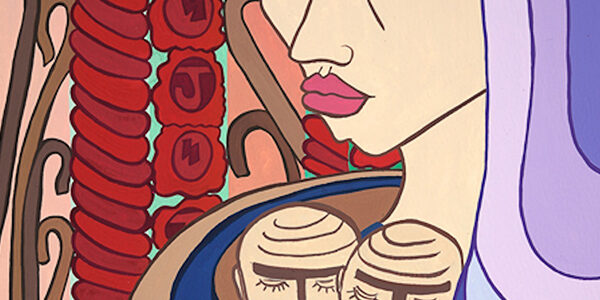While some of the stories we share here are written as fiction, they reflect the themes and key messages we’ve heard from real people who have discovered the truth that Jesus is enough.
Spilled Quiche
It happened when I was changing Sarah’s diaper. I had left the kitchen for just a few moments. I heard a crash and the sound of two pairs of little feet running away. As I ran back, there it was; my cheese and zucchini quiche scattered across the kitchen floor.
Bryce’s parents loved quiche. We had invited them over to celebrate Bryce’s promotion to District Manager. Now I had no meal to serve. Instead, I had a mess to clean up. And I had at least one child to discipline — or comfort — until I found the culprits, I wouldn’t know which. The funny thing was, I wasn’t even angry. I just felt numb.
The quiche was a small thing really, but dinner was in only a few hours. I still needed to pick up my son, Spencer, from soccer practice and stop to buy ice cream. The living room needed to be cleaned, the kids changed into their good clothes, the table set, and I still needed to make myself presentable! The kicker was that the promotion had come unexpectedly, so the dinner was hastily scheduled for the day I had planned for accomplishing my church responsibilities.
Even before the quiche catastrophe, I had had only a slim chance of getting all the tasks completed without help. Like a fool, I had given into Rachel’s pleas to spend the day with her friends so I couldn’t rely on her help. In the past, Bryce would have at least kept the smaller kids out of trouble, but with his new responsibilities at church, he now spent Saturdays on church business. And this promotion will mean even longer hours at work. So, it was up to me. And I couldn’t do it. I didn’t have the strength to make the effort anymore. I was so very, very tired. I even felt resentment for my husband’s successes and my children’s freedoms.
Failure Personified
It had never been easy, even when I was younger. But at least I had survived. I never understood why it always seemed harder for me. I struggled where the other mothers flourished. Like Hannah. She has the same number of children, but on Sunday they all look like angels. She never has a hair out of place. Every word out of her mouth is uplifting. I try to emulate her, but all I seem to do is fall short, complain and then feel guilty.
As I sat looking at the spilled quiche, I could already see the disappointment in my husband’s eyes at the store-bought chicken dinner. I could see the appraising glances of my mother-in-law at my imperfect home and disheveled children. I could even see my own self-appraisal as I looked in the bathroom mirror after everyone had left. It would not be the first time I had seen such looks. I can’t count the number of times I stared that stare back at myself from the mirror. And then I knew. I knew. I was a failure!
This recognition, in a perverse sort of way, made things easier. It enabled me to clean up the quiche. It calmed me enough to console my two culprits. Turns out they were trying to “Help Mom” by setting the table when the pan slipped from their too-small hands. My recognition of failure blunted the disappointed and disapproving looks. But it also magnified my own harsh self-appraisal. I knew I had to find an answer; some way to fulfill the duties of my callings! I could not keep going on like this. My life had become a curse.
Predicated Upon Unworth
I talked to a church leader after church the next day. I knew he would probably say something to Bryce, but I had to start looking for help somewhere. He said he would forward a message that the head of our church had given concerning conflicts between church and family duties. He said that while it addresses church leaders, in particular, its principle was universal.
As I read the email later that afternoon the words were never clearer: “I know that the work is hard at times. There are never enough hours to get it done. The calls are numerous and frequent. You have other things to do. That is true. You must not rob your employer of the time and energy that are rightfully his. You must not rob your family of the time which belongs to them. But as most of you have come to know, as you seek for divine guidance, you are blessed with wisdom beyond your own and strength and capacity you did not know you had. It is possible to budget your time so that you neglect neither your employer, your family, nor your flock.”
These words shook me to my very foundations. I had always diligently prayed for strength and guidance. Nothing was more important to me than my family and my church — my duty to God! But I had not been blessed with the wisdom and strength promised in that message. It could only be that I was unworthy of such divine blessings. Even an idiot could reason it out: “If all God’s blessings are predicated upon obedience…” and I lacked such blessings — that had to be because of my failures, my unworthiness. This recognition intensified the feeling that I was living under some cruel curse.
Shouts in My Pain
Then, at that exact moment, something strange happened. It was as if an unseen hand turned my head. I found my eyes focused on a forgotten text on my bookshelf. I received an impression to open it. It was a book of famous quotes from my college days. At the time I had a dream of becoming an author. That was before I had committed myself to the roles of wife, mother and church member. A little unnerved, I fetched the book and started to browse under “Failure”.
Few of the people quoted professed any belief in Heavenly Father. But I knew of at least one who did, C. S. Lewis. I knew our church viewed him favorably, so I looked specifically for quotes by him. One of his quotes caused me to almost drop the book. The words were: “God whispers to us in our pleasures, speaks to us in our conscience, but shouts in our pains: It is his megaphone to rouse a deaf world.”
While not the answer I sought, I knew this was an answer, of sorts. I was suddenly certain Heavenly Father was shouting to me in the pain of my failure. This feeling supplied the courage I needed to seek out an answer to my pain. I resolved to understand what Heavenly Father was shouting.
I remembered Christina, a mom from one of the boys’ soccer teams. We had talked in the past about the Narnia movies based on C. S. Lewis’ stories, so I knew she had an interest in his writings. I decided to give her a call. As luck, or the hand of God, would have it she was available to come over Monday morning. I prepared for our discussion by browsing the quotes of C. S. Lewis and making a list of the ones that spoke to me.
Not Worth Dying For
As Christina and I met the next day I gave her a copy of my list. I gave her a few moments to scan the list and then pointed at the first quote reading, “Christ died for men precisely because men are not worth dying for; to make them worth it.” Then I added “When I found this quote it intrigued me. It seems to be speaking to me, speaking about me, but I can’t understand it. It seems to contradict itself.”
Christina responded, “I am not surprised. That quote contains one of the most fundamental mysteries about the nature of God.”
My friend’s response confused me, so I asked, “How so?”
She looked long at me, seemingly considering different ways to answer. Finally, she said slowly, tenderly “Do you believe you are worthy to have had the Son of God die for your sins?”
As I considered her words, I felt a flash of anger — and then of shame. But I could clearly see my friend was not making an accusation, only a sincere inquiry. I answered tentatively, “No, I, in particular, am not worthy of Christ’s Atonement, but I hope one day to become worthy of it.”
Now it was Christina’s turn to ask, “How so?”
Living Under a Curse
As my answer, I recited: “Christ died so that one day we might live forever with Heavenly Father. He did his part by opening the door. Now I must do my part by following his example. I become worthy of Christ’s Atonement by doing all I can to follow God’s commandments and to fulfill the duties of my callings.”
Christina paused, looked at me deliberately and said solemnly, “And how is that going for you?”
Again, I flushed and looked in her eyes for any sign of malice. All I saw was genuine concern. Her eyes glinted in anticipation as if she held some unspoken solace. Yet Christina’s words convicted me with my own testimony. I did not reply right away. My feelings were not something I could easily share. I had been conditioned to always project a positive image even when I was crying inside. To expose my sense of failure felt like a violation of a church secret.
But I could sense her kindness. The hint that she held a promise of relief pulled at my pain. That pain demanded an answer. It needed to be heard! So, I slowly confessed, “Not very well. It’s like I’ve been living under a curse. I can’t hold all the pieces together. And the most painful thing is I don’t know that I have the courage to make the effort anymore!” The starkness of my confession shocked me, but it was strangely liberating. I tried to push away the sense of shame that followed.
I could see tears well up in Christina’s eyes. This was not the reaction I had expected. In a slightly broken voice, she asked if I would get my Bible. As I retrieved my Bible, I wondered at my friend’s emotions. When I returned, I handed the book to Christina. She turned to the third chapter of the letter to Galatians and handed back the book pointing at verse ten. I read: “For as many as are of the works of the law are under the curse: for it is written, Cursed is every one that continueth not in all things which are written in the book of the law to do them.”
She shared, “Susan, you are living under a curse, as is everyone whose blessings are predicated upon following a set of commands that cannot be perfectly followed. Such people are doomed to failure. They think they can qualify for God’s blessing through their obedience — blessings like forgiveness and eternal life, but instead they disqualify themselves through their disobedience.”
He Shall Lift You Up
Christina’s words were not very encouraging. Even though she did a good job of defining my personal hell, I was starting to regret inviting Christina over.
But she was not done. “Yet there is good news!” She gently reached for my Bible, turned to the Old Testament and started reading from the Psalms: “‘The Lord is nigh unto them that are of a broken heart; and saveth such as be of a contrite spirit.’”
James put it this way: ‘Humble yourselves in the sight of the Lord, and he shall lift you up.’ You see, Susan, before a person can see her need for a Savior who did everything for her, she must first recognize she can’t do it herself — she must have a contrite spirit — she must have humbled herself.”
“I certainly have been humbled by my failures. But Christina, I don’t see how my mistakes could bring me any good news. They just make me unworthy! Why would Heavenly Father want to help anyone who is as unworthy as I am?” I asked.
Love Over Obedience
“The answer to your question is the fundamental mystery about the nature of God alluded to by C. S. Lewis in the quote you shared. Many people miss it and many other people find it and then reject it. But C. S. Lewis understood it and held it close. Another of his quotes is, ‘[God] is not proud…he will have us even though we have shown that we prefer everything else to Him.’ Susan, here is the mystery: God loves us in spite of our disobedience; in fact, he wants our love much more than our obedience. So, he sent his Son as The Atonement to pay for every one of every person’s sins — to remove their guilt! Everybody who believes, who trusts in, this truth receives his blessings — including forgiveness and eternal life. And those who strive to qualify for God’s blessings through obedience prove they do not believe this truth! But don’t take my word for it. Turn to Ephesians 2:4-5.”
I turned to the passage and read, “But God, who is rich in mercy, for his great love wherewith he loved us, Even when we were dead in sins, hath quickened us together with Christ, (by grace ye are saved;).”
I was beginning to see what Christina was trying to teach me, but I still had one major reservation and I voiced it. “If people don’t have to be obedient to qualify for God’s blessings and instead, he gives his blessings out of love to the unworthy, then people would just do whatever they wanted!”
Christina smiled slowly and put her hand on my shoulder. “Susan, I don’t think you’ve thought it through very well. I’ll give you an illustration. Do you love your husband?” I nodded yes. “Do you try to please him?” Again, I nodded yes. “Why, Susan? Is it because you are trying to ‘qualify’ for his blessings?”
“Of course not! It’s just because I love him.”
“And if he does something especially gracious for you; something you don’t expect — something you don’t think you deserve; maybe even something you could never do for yourself?”
“That just makes me love him more.” It was as if a veil was dissolving before my eyes. More slowly I continued, “And the more I love him; the more I want to please him.”
Died For the Unworthy
Seeing my enlightenment, Christina beamed as she said, “Out of Heavenly Father’s great love for man; Christ died for the unworthy, for people like you and me. The sacrifice of his perfect life has washed us clean, made us worthy. God grants us immense blessings we are unworthy of, that we could never get for ourselves.”
Then she looked deeply at me and said, “I believe this! And I love Heavenly Father because he has so loved me. The more I see how unworthy I am of his love; the more I love Him. It is when I have been humbled by my failures that I love Him most! And I live every day in thanksgiving. I strive to be obedient to show Him my love. I have been freed from the curse of blessings predicated upon obedience — the curse of blessings lost by my disobedience. Instead, I am free to give my obedience to God as an expression of my love. And I am free of the fear that my failures will cause Him to withdraw his love from me.”
As Christina bore her testimony, I made it my testimony. I believed and I was healed. My pain disappeared. My guilt was removed. My sense of failure evaporated. I was filled with an immense love for my gracious and loving Heavenly Father. I committed my life to a Savior who did what I could not. And to the Father who sent his Son out of love for his unworthy children, a Father who blesses me in spite of my failures.
The Blessing of Failure
The recognition of my failure was a gift because it opened my heart to the mystery of Heavenly Father’s unfathomable love. It drove me to seek an answer. One unexpected answer I found was that Heavenly Father was calling to me through the pain of my failure. Ultimately, my failure led me to the answer of Christ’s Atonement. Not an example that merely opened the door. No! But the perfect substitute sacrifice who did what I could never do. In so doing, Heavenly Father blessed me by removing the stain of my failure. I learned that he does not require me to prove I am worthy before he will dispense his blessings. No! Heavenly Father blesses me out of undeserved love precisely because I am an erring creature and cannot be worthy of his blessings. And my response is to offer my love to my Father and my Savior.
A Life of Love
Today, I live my life as Christina does hers — as a testament of love for Heavenly Father’s undeserved blessings. I have been set free of a life of striving to be worthy to receive God’s blessings — a life of failure. I still have quiche catastrophes, and at times disapproving looks and disheveled children. But they have nothing to do with my righteous status before God. In his eyes I am worthy. Knowing my status and knowing I have already been granted eternal life helps me not only survive the struggles in my life, but to actually flourish in a chaotic world. My burden is light because the work of earning God’s blessings is done. When I look in the mirror after a trying day, I see what Heavenly Father sent his Son to make — a forgiven, radiant and worthy child of God!

Are you anxious?
Free Scripture Study
We are all carrying something. Weariness from the treadmill of life, isolation and loneliness from feeling like we don’t belong, anxiety over what might happen to us and those we love in the end, bitterness from failing to forgive, or tension from having forgiveness withheld from us.
Our FREE, Handbook for Healing scripture study identifies your pain, shares the cure and provides a treatment plan for living a life of freedom, forgiveness and peace can look like for you.



